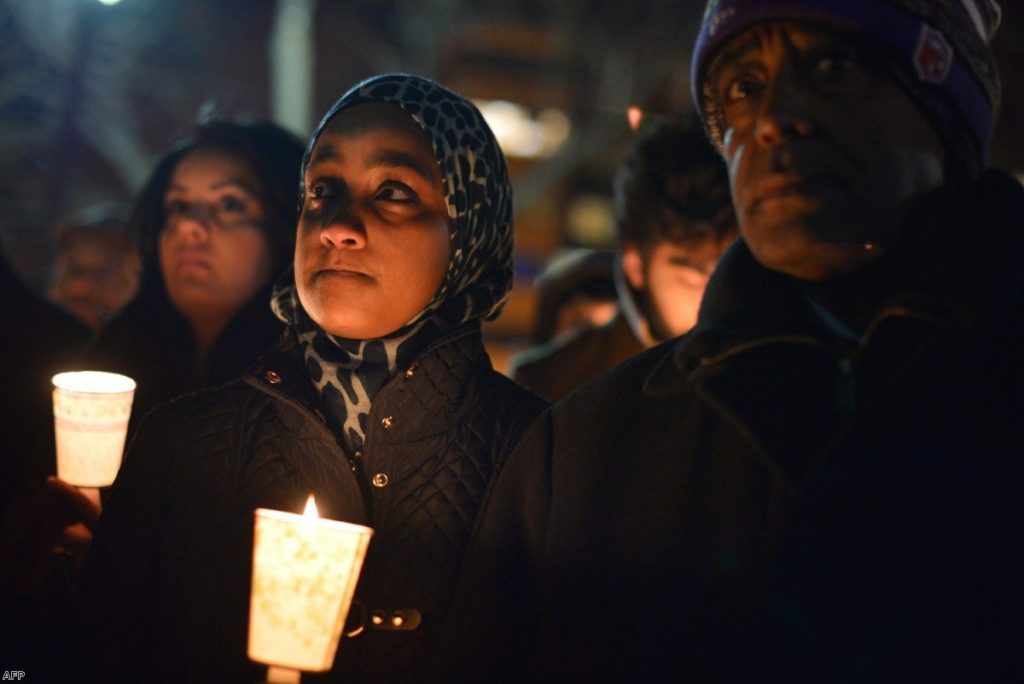‘Muslim Lives Matter’ protest outside BBC is deeply misguided
The BBC is everyone's villain, a handy peg for grievances across the political spectrum. Protests against Israeli's obscene military campaign in Gaza last summer often started at New Broadcasting House and seemingly directed as much anger at the corporation as they did at the Israeli government. Barely a day passes without a right-winger on Twitter complaining about the supposed left-wing slant of its political coverage – coverage delivered by Nick Robinson, Robert Peston, John Humphries and Evan Davies.
Last night it was the turn of anti-fascist and Muslim demonstrators, who held up signs saying 'Muslim Lives Matter' outside New Broadcasting House. They were protesting about the supposed lack of coverage of the Chapel Hill shooting in the US earlier this week. Campaigners said the corporation's failure to report on the attack showed it cared less about Muslim lives compared to the white satirists shot at the Charlie Hebdo office last month.
As a matter of fact there are six separate news reports on the killings on the BBC website. The perceived lack of media response – which lasted a few hours at most – probably had more to do with the fact the police only released the names of those killed at 2 am on Wednesday morning. By the time the judge ordered the suspect to be held without bond on Wednesday, most news outlets in the US had reported the killing and Twitter was ablaze with commentary – certainly far more than accompanies the majority of murders in the US.
Unlike Charlie Hebdo, it was not immediately obvious if the Chapel Hill killing was a terror attack. It’s true the suspect wrote atheist slogans on social media, but police were working under the assumption it was a dispute over parking, while still investigating whether it could be a hate crime. The fact the victims were Muslim and the suspect an atheist does not immediately make it terrorism. Now the suspect is in custody, media outlets will be aware that speculating too extensively could compromise the right to a fair trial.


There are over 16,000 deaths in the US a year. They will not all be reported. In fact, as the Guardian showed yesterday, it is often newsworthy when a city like New York goes a whole ten days without a murder.

Anders Breivik's killings in Norway were treated as less political than Islamic attacks
Deah Shaddy Barakat, Yusor Mohammad Abu-Salha and Razan Mohammad Abu-Salha were people, not representatives of the grievances of the Muslim community. The BBC did what any other news outlet would do in circumstances like these: establish what happened, try not to extrapolate too extensively on the basis of incomplete information, provide accurate and proportionate coverage. The protest against it is absurd.
So why does it happen? Because at the heart of most wrong-headed protests there is a kernel of truth. The truth in this case is that Muslims have been forced into a media narrative in which they are always the perpetrator, never the victim. When they commit crimes the coverage is given an ideological bent. When white people commit crimes, they are an example of random chaos.
In 2011, Anders Breivik killed 77 people. His crime was treated as an act of brutal psychotic madness, even though he made it clear online that he saw himself as a warrior for Christian traditionalism. When Islamic terrorists perpetrate similar crimes, the religious and political motive is put front and centre of the coverage. Paedophilia is similarly covered as a crime, but when gangs were seen to be targeting under-age teenage girls in Rochdale, their Asian background was treated as an explanatory factor.
This gives us a hopelessly imbalanced impression of the threat from lunatic fringes of Islam. In the last five years just two per cent of terror attacks in Europe were Islamic – the rest were mostly separatist movements. In 2013, Americans were more likely to be shot by a toddler than an Islamic extremist.

The BBC is accused of bias by all parts of the political spectrum
This slanted coverage is not part of a racist agenda. Journalists and editors simply internalise narratives and try to fit the random chaos of daily news into those storylines, whether it's Ed Miliband being weird, welfare recipients being scroungers or the culture war supposedly taking place between Muslims and the enlightenment of the West.
That narrative is false, but having been internalised it provides a framework for journalists and newspaper readers which serves to make it more and more true. It lays firm bricks on sand.
But just because Muslims and those sympathetic to them have justified grievances, does not mean we should give up our mental faculties. The way to challenge a narrative is not to impose your own one on whichever event happens to be in the news today.
It is unclear what happened on Chapel Hill on Tuesday. It's quite possible disputes over things like parking spaces are made more severe by religious tension. That would still not make it a terror attack, but it would show us how dangerous the increasingly poisonous relationship between Islam and the West can become if we do not moderate our approach. We don't know, because the information is not clear and a trial has not taken placed yet.
The coverage of Chapel Hill is not an example of media hypocrisy. It was the sort of sane, proportionate coverage which should be applied to Muslim perpetrators of violence too.

